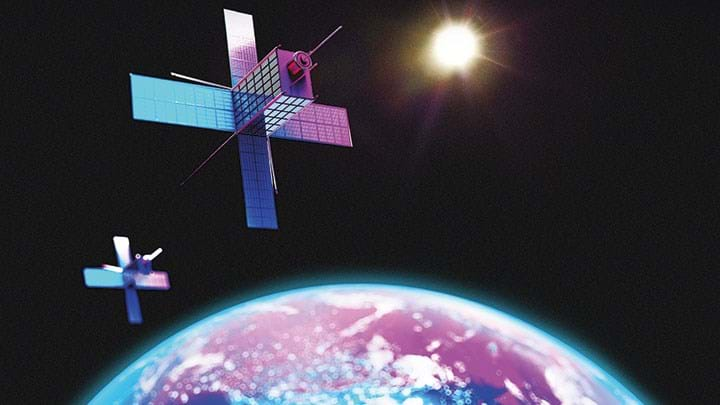Made in Space

Andrew Bacon talks to Adam Duckett about plans to launch feedstocks into space, and bring them back to Earth as manufactured goods
WHILE our first two interviewees plan to manufacture in space using resources that are already out there – whether that’s orbiting junk or minerals on the Moon – Andrew Bacon is on a mission to launch feedstocks into orbit, turn them into high-value products that can only be made in space and then return them to Earth.
Bacon is the CTO of Space Forge, which signed a deal in March to launch its first satellite later this year from the UK. The satellite, which is around the size of a loaf of bread, is called ForgeStar Zero (artist’s impression above) and is the smallest of three designs that the company will launch to prove it can return manufactured goods to Earth. This first launch will demonstrate the company’s re-entry system.
“It’s a deployable heat shield that’s protects [the satellite] during re-entry and keeps it stable. That’s quite a unique thing to have on a satellite. It is a returnable satellite, which is a new invention.”
If proved successful, early next year the company will launch a microwave-sized ForgeStar One that will demonstrate the manufacturing capabilities. Ultimately, the company wants to provide satellites that house production systems for researchers and manufacturers.
“It’s designed to provide a lot of power to a payload, enough that you could melt material or create a plasma for sputtering.” Given the costs of launching feedstocks into space, Bacon expects the system will produce high-value products like semiconductors, superalloys and pharmaceuticals.
“Look at nickel-based superalloys. You’re currently paying something like US$50,000/kg for those.”
Launch costs are falling as private companies commercialise space exploration. Space X’s huge Falcon Heavy rocket costs around US$1,500/kg launched to low earth orbit, though the price for launching much smaller payloads are considerably higher, such as Rocket Lab’s Electron which costs around US23,000/kg.
Bacon studied electronic engineering with space science technology at the University of Bath before working at Thales Alenia Space, where he met his Space Forge cofounder Joshua Western. A push to manufacture high performance fibre optic cables in space inspired the pair to form their own company, now based in Wales.
Recent Editions
Catch up on the latest news, views and jobs from The Chemical Engineer. Below are the four latest issues. View a wider selection of the archive from within the Magazine section of this site.




